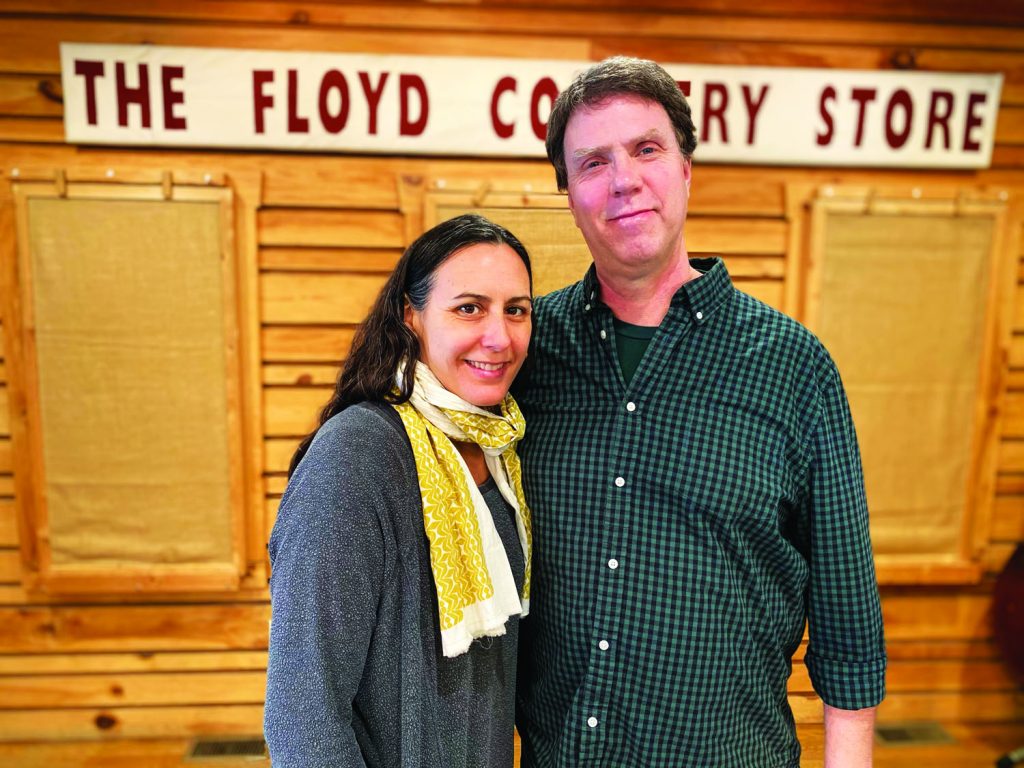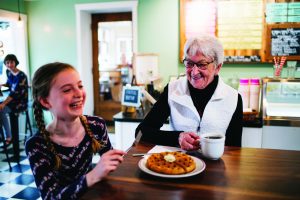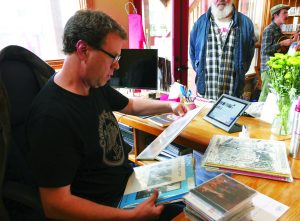
By Lindsey Terrell
When Dylan Locke and Heather Krantz bought The Floyd Country Store from Woody and Jackie Crenshaw in the fall of 2014, they knew they wanted to preserve the beautiful traditions that had been going on since the early 1900s.
The building had taken many forms over the years – grocery store, farm store, music venue – but one thing held steady: it was always a community space.
Dylan and Heather set out to nurture the longstanding traditions of the Country Store and to accentuate them with food, retail, and other themes focusing on the local.
They prioritized a strong relationship with the music community, including, but not limited to, old time, traditional, and bluegrass music, as well as dance.
Dylan explains that they were drawn to the old Country Store’s energy and the connectedness it fostered. They sought to keep “one foot firmly planted in the past with the other foot moving the Store into the future.” The commonality between the past and the future for them was the ideal of simple living, especially through social connection with all generations.
Dylan and Heather were no strangers to this kind of business. Dylan had years of experience promoting a variety of musical acts, and Heather had been involved in the local music scene which is where she met Dylan. In addition, Heather had worked at the Country Store for Woody and Jackie Crenshaw, doing booking and marketing. When they took over the Store, their respective skillsets enabled them both to manage events and business at a high level.
The Floyd Country Store grew and flourished. Soon, music events were held six days a week, with the Friday Night Jamboree honored as a 35-year tradition. The venue was celebrated and supported by Virginia Tourism, and travelers on The Crooked Road (Virginia’s Heritage Music Trail) were always sure to put the Store on their itineraries.
Visitors didn’t want to leave. Travel and tourism writers raved about it. It got a front-page feature in the Washington Post, along with features in Southern Living, Garden & Gun, and on NPR and the BBC. The good food, the fun, and the retail, as well as the common connection shared by all, kept cars on the road to Floyd. People got used to seeing the “fixtures”, meaning the regulars at the store, but they also got to experience new folks walking in and sitting down next to them.
Many feel strongly that the experience is “uplifting and transformative.”
 In addition to strengthening the music and community around the Floyd Country Store, the couple also added new projects and revived others. They founded the Handmade Music School in 2016, and in 2019 reopened the historical County Sales music store, which was first established as a record label by David Freeman in 1965. In the fall of that same year, the Soda Fountain at the Floyd Country Store opened its doors.
In addition to strengthening the music and community around the Floyd Country Store, the couple also added new projects and revived others. They founded the Handmade Music School in 2016, and in 2019 reopened the historical County Sales music store, which was first established as a record label by David Freeman in 1965. In the fall of that same year, the Soda Fountain at the Floyd Country Store opened its doors.
Being primarily an event venue and community gathering place, the impacts of the COVID-19 pandemic hit hard at The Floyd Country Store. In normal times, the energy generated by the music and dance at the Store creates an atmosphere where age doesn’t matter. Folks that have been a part of the Store since the first Friday Night Jamborees share the floor with families, students, and travelers.
Everyone joining in leaves their differences at the door and “steps into something inherently good and needed,” says Heather. “We are in the business of bringing people together, and the restrictions of operating during a pandemic and staying in touch with our community has been a challenge.”
 The mission of The Floyd Country Store has long been to make their events accessible and affordable. Dylan and Heather are more dedicated to celebrating traditional music and dance than making profit from it, so they have kept prices low to allow many people to come and enjoy performances. The model works when lots of folks can be in the building, but not with limited occupancy and social distancing. Very fortunately, friends and fans of the Floyd Country Store were able to ease the strain of the pandemic’s impact with a fundraiser in late 2020. The local and global community rallied together to help sustain and ensure the institution’s future.
The mission of The Floyd Country Store has long been to make their events accessible and affordable. Dylan and Heather are more dedicated to celebrating traditional music and dance than making profit from it, so they have kept prices low to allow many people to come and enjoy performances. The model works when lots of folks can be in the building, but not with limited occupancy and social distancing. Very fortunately, friends and fans of the Floyd Country Store were able to ease the strain of the pandemic’s impact with a fundraiser in late 2020. The local and global community rallied together to help sustain and ensure the institution’s future.
Dylan, Heather, and their team adapted to Covid restrictions with creativity. Friday Night Jamborees were moved safely outdoors and live streamed around the world. During the winter months, social media platforms like Facebook and YouTube became the venues for live and pre-recorded performances. The Handmade Music School introduced online lessons, as well as a virtual workshop and lecture series called “Handmade at Home.” Finally, County Sales worked to fine tune their online offerings. All wings of the organization worked together to bring content, entertainment, and inspiration to the community.
It became clear that, despite the many strains and restrictions Covid had brought on Dylan, Heather, and their team, they were able to – albeit with some difficulty and road bumps – adapt to and creatively reinvent the meaning of community connectedness in a predominantly virtual world.
When asked what lessons they learned from this time and about their vision for the future, Dylan and Heather spoke of synergy between the Floyd Country Store, Handmade Music School, and County Sales. The creative arts generate a high-level of human connection that can withstand the trials of a pandemic.
“Change can happen at any point in time,” says Dylan, “but if we operate with creativity and are able to adapt and grow with the challenges, we can be prepared for the difficult journey ahead.”
County Sales and the Handmade Music School now operate under the umbrella of “Handmade Music”, a 501(c)(3) nonprofit. Going forward, the school will offer robust learning opportunities both in-person and online. Also, County Sales will expand its work as a resource to the old-time, country, and bluegrass music community through honoring historic recordings and assisting living artists. And of course, the Floyd Country Store will always offer delicious food, quality retail items, and the music events that bring folks from around the world. Eventually, the in-person music and dance will be back, better than ever.
 Dylan and Heather have learned new ways to engage with the community; ways they plan to keep offering in the future, including live-streamed events, virtual lessons, lectures, and workshops, online ordering for the café, and artisan goods available through the website. The two have also realized that The Floyd Country Store, Handmade Music School, and County Sales can work together to offer unique and inclusive visitor experiences, especially when it comes to traditional music.
Dylan and Heather have learned new ways to engage with the community; ways they plan to keep offering in the future, including live-streamed events, virtual lessons, lectures, and workshops, online ordering for the café, and artisan goods available through the website. The two have also realized that The Floyd Country Store, Handmade Music School, and County Sales can work together to offer unique and inclusive visitor experiences, especially when it comes to traditional music.
By carefully connecting some of these moving parts, Heather and Dylan will be able to offer immersive cultural opportunities, while at the same time supporting and encouraging individuals and businesses in the community. Through adapting to the challenges of Covid, the pair hope to aid the Floyd community in preparing for growth, overcoming differences, and the challenges that come with change. With all the work involved, the couple know it’s about something much greater than themselves.
For more information about the Floyd Country Store, music events, Handmade Music School, County Sales, the Soda Fountain, and more, visit online at www.floydcountrystore.com. You can also follow on Facebook at floydcountrystore. The Floyd Country Store is located at 206 S. Locust Street in Floyd, Virginia.
Dylan Locke and Heather Krantz
Floyd Country Store, Handmade Music School,
County Sales, & the Soda Fountain
206 S. Locust Street in Floyd, Virginia
www.FloydCountryStore.com • (540) 745-4563
Facebook.com/floydcountrystore
